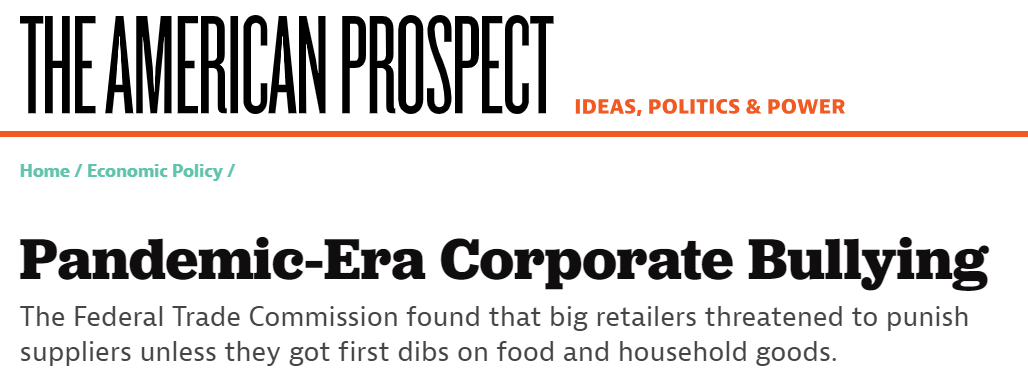Welcome to DU!
The truly grassroots left-of-center political community where regular people, not algorithms, drive the discussions and set the standards.
Join the community:
Create a free account
Support DU (and get rid of ads!):
Become a Star Member
Latest Breaking News
General Discussion
The DU Lounge
All Forums
Issue Forums
Culture Forums
Alliance Forums
Region Forums
Support Forums
Help & Search
General Discussion
Related: Editorials & Other Articles, Issue Forums, Alliance Forums, Region ForumsPandemic-Era Corporate Bullying: Big Retail threatened to punish suppliers unless they got first dibs on food/home goods


According to the FTC, powerful retailers used “on-time, in-full” policies to “pressure their suppliers to favor them over rivals” during the pandemic supply chain crunch.
It’s a big deal when America’s top monopoly cop, the Federal Trade Commission, spends its finite time and resources studying an industry. The agency was created a century ago precisely to figure out which markets were working and which weren’t, but for decades the agency did very little of that kind of inquiry. Under Joe Biden, the FTC’s leadership has rekindled that core function, and last week the agency published the results of its examination of one of the decade’s most vexing problems: the fracturing of the grocery supply chain, and the subsequent and ongoing price hikes seen during and since the COVID-19 pandemic.
The FTC’s supply chain study, two years in the making, was succinct but clear: Documents and data from some of America’s largest grocery retailers, producers, and wholesalers showed that in those first months after the onset of the pandemic, dominant mega-retailers had flexed their muscle as the country’s largest buyers of food, shampoo, toilet paper, and every other consumer good to demand their suppliers fill their shelves first, likely at the expense of smaller stores around the country. The formula the FTC laid out in its findings suggested as straightforward a display of power as one can find in industry. The onset of the pandemic sparked chaos throughout the supply chain, disrupting manufacturing, shipping, and every other step along the path from factory to market. According to the FTC, powerful retailers used “on-time, in-full” policies to “pressure their suppliers to favor them over rivals.”

The pressure worked to ensure those monopoly retailers had preferential access to products in short supply, because “suppliers feared the financial penalties” those retailers could and would inflict on them if they didn’t deliver the goods. The FTC specifically named Walmart’s requirement that 98 percent of its orders be delivered on time and in full to avoid significant cash penalties. The findings weren’t exactly shocking. Walmart’s policy had been reported elsewhere, and there are dozens of examples of small stores and shops that have been unable to access the same goods, at the same prices, as their much larger rivals. Some of that access discrimination can be attributed to the same pandemic-era muscle-flexing the FTC found in the report, like Home Depot president Tim Decker bragging in 2021 that his company had gained market share during the pandemic because its size and buying power often put it at the front of the queue when its suppliers ran short on goods.
But though the FTC focused on the pandemic in particular, the economy is filled with examples of supply discrimination outside of that historic disruption. Small toy stores, for example, have been shut out by toy makers like Mattel, unable to afford the mandatory minimum number of toys they’re required to buy. Small brewers have struggled to access cans at a competitive price after Ball, the country’s largest aluminum can maker, raised both the price of cans and the minimum amount it required small brewers to purchase, according to the Brewers Association. It’s a chain-reaction epidemic, where power buyers demand preferential treatment, and big manufacturers are willing to grant it to ensure access to those powerful chain stores. Meanwhile, local shops and makers are often left out. The FTC’s report didn’t focus on recommendations, but in a public meeting announcing the findings of the investigation, agency chair Lina Khan said that if any of the conduct identified in the report violated the antitrust laws, including the long-dormant Robinson-Patman Act, the agency would take action.
snip
InfoView thread info, including edit history
TrashPut this thread in your Trash Can (My DU » Trash Can)
BookmarkAdd this thread to your Bookmarks (My DU » Bookmarks)
0 replies, 261 views
ShareGet links to this post and/or share on social media
AlertAlert this post for a rule violation
PowersThere are no powers you can use on this post
EditCannot edit other people's posts
ReplyReply to this post
EditCannot edit other people's posts
Rec (1)
ReplyReply to this post